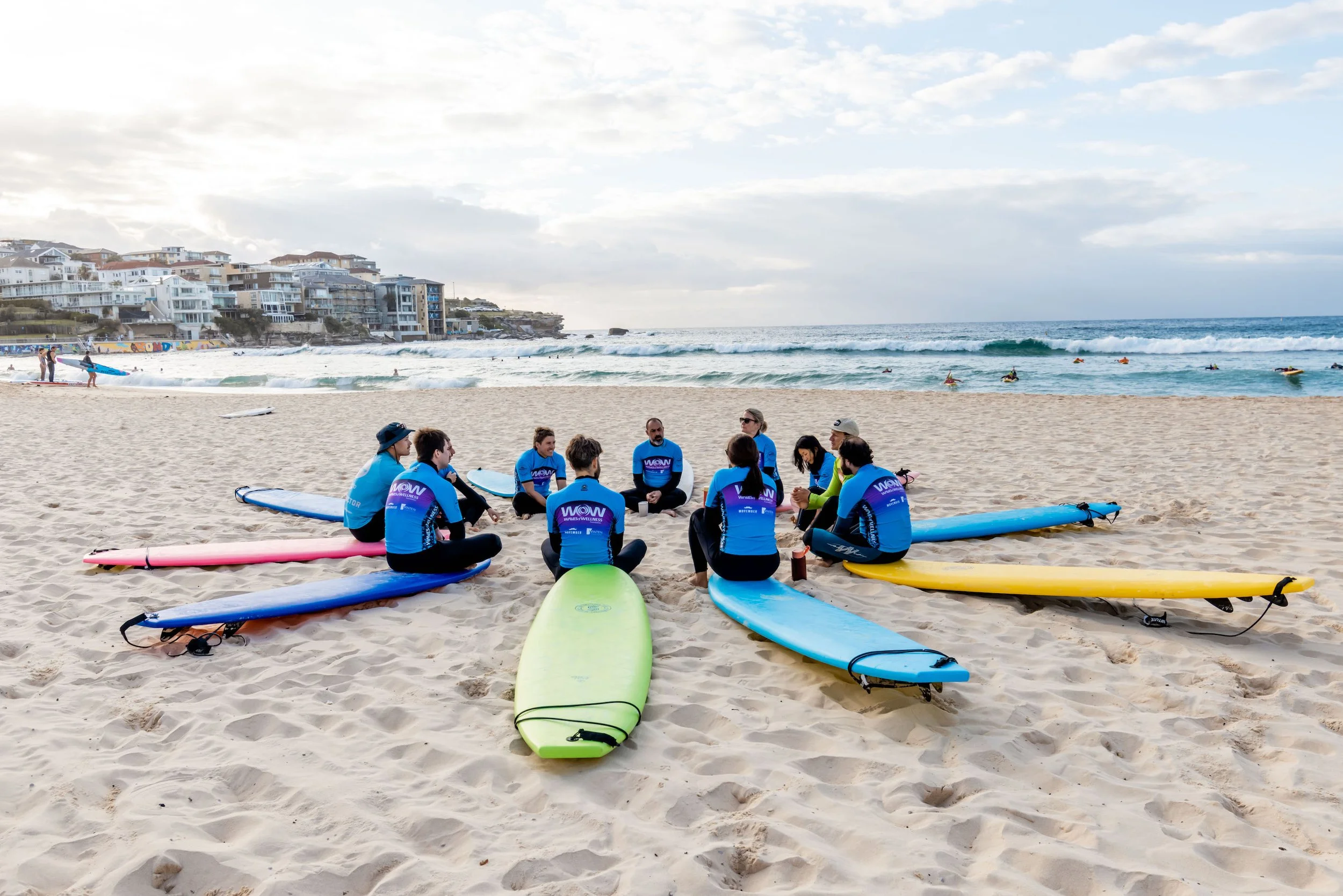"Feels Good to Get Wet": The Research on Surf Therapy Explained
Image: Rory Forbes-Lange
Rebekah Prendergast explains WOW’s pioneer research into the benefits of surf therapy….
At Waves of Wellness (WOW) we combine surfing and therapy to save lives. While it's a global concept - and a growing one - very little research has been done into surf therapy.
Surf therapy is defined by the International Surf Therapy Organisation as an intervention that combines surf instruction, surfing, and structured individual and/or group activities to promote physical, psychosocial, and psychological well-being. In addition to physical exercise, surf therapy typically includes individual mentoring, social skills development, psycho-education, and group discussions focused on increasing resilience and personal growth.
It's well-established that regular physical activity can enhance mood and alleviate mental health issues. Previous studies have found significant relationships between exercise and lower levels of mental health symptoms, and greater psychological well-being for youth, and evidence worldwide has validated the use of surfing as a therapeutic mediator to achieve positive change. However, no such research has been conducted on Australian adolescents.
That's why we were thrilled to participate in a recent small-scale study to demonstrate the feasibility of surf therapy as an effective intervention for Australian at-risk youth. The study, "Feels Good to Get Wet": The Unique Affordances of Surf Therapy Among Australian Youth, was carried out by researchers from the Australian College of Applied Psychology, Deakin University, UNSW, and Waves of Wellness Co-Founder and CEO Joel Pilgrim and Chairman Philip Ward.
A bit about the study
This study was the first to examine the impact of surf therapy on Australian at-risk youth between 14 and 17 years old. The WOW 8-week surf therapy program was implemented with nine participants in Bondi in August of 2020. The sessions combined the action of surfing with psycho-educational discussions aimed at increasing awareness and understanding of various aspects of mental health.
A mixed methods research design was adopted to examine the experiences of participants and effects of the WOW program on self-esteem, resilience, social connectedness, and depressive symptoms. As an exploratory study, the specific aims were to advance current understandings of surf therapy as an alternative therapy for youth populations and inform future research by examining participants experiences of the program.
The findings
Findings from the study were overwhelmingly positive, with participants agreeing the program enabled them to normalise their struggles with mental health and shift the perception that they were suffering alone. The water-based environment facilitated deeper understandings of mental health, achievement of coping strategies, and fostered mastery experiences.
Participants reported that the environment and enjoyment of the program resulted in noticeable improvements in emotional wellbeing, attitudes, and confidence. The experiential nature of the program was also noted to help establish the importance of relaxation and self-care, and demonstrated how to foster healthy relationships.
Image: Rory Forbes-Lange
Some of the key themes to come out of the research include:
A shared experience
The most perceived benefit of the program identified by participants was the realisation that they are not alone or different, as many individuals struggle with mental health. One participant commented “it made me feel less alone and realise that there are lots of other people who feel the same way I do and are going through similar struggles.” The open discussions during the WOW program appeared to also reduce the stigma associated with mental health difficulties and increased participants' empathy.
Unique learning environment
Participants agreed that the program was effective in providing an environment that facilitated psycho-education, an enjoyable experience, a sense of mastery, and increased confidence.
It became apparent during the interviews that the participants felt the program offered a non-judgemental and supportive environment and removed any perceptions of failure. As a result, participants were able to enjoy the experience without fear of judgement and unanimously agreed that the ocean, the social environment, and the facilitators' positive attitudes were responsible for their positive experiences.
The physical act of surfing also presented the opportunity for participants to engage in mastery experiences during the program. When participants learnt a new skill or successfully performed it, they felt a sense of achievement and mastery which they noted positively impacted their mood and confidence.
Personal growth
Through engaging in the program participants noticed development of relaxation skills, self-care strategies, positive attitude shifts, improved emotional well-being, and the ability to foster healthy relationships.
In addition to growth in personal practises, participants reported that they experienced a positive shift in their attitudes towards daily activities and greater emotional wellbeing, particularly on days where they engaged in the program. They reported increases in tolerance, willingness, concentration, alertness, and motivation.
The experiential nature of the program also allowed participants to cultivate relationships with each other. One participant stated:
“everyone in the group shared their personal experiences and gave insight into the relationships in their lives and the importance, or in some cases, detriment of them. I personally came to the conclusion to not take things so seriously, that friends will come and go, and to simply enjoy the moments with the people I love.”
Surf therapy for the win
Overall, the shared experience in a unique learning environment allowed participants to engage in learning and personal growth across a range of areas. The results suggest that surf therapy may afford distinct opportunities and benefits not found in traditional therapies.
Despite the small sample, the findings from this study provide preliminary evidence of the effectiveness of surf therapy among Australian youth and offer a potential starting point for further research utilising larger more diverse samples.
If you would like to explore the research further you can read the full study here.


